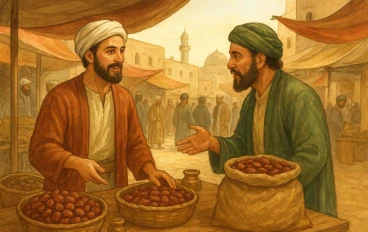
The Conquest of Mecca
The Conquest of Mecca: Events and Details That Changed Islamic History
The Conquest of Mecca stands as one of the most significant events in Islamic history, marking a pivotal moment in the spread of Islam and uniting the Arabian Peninsula under its banner. This event was not just a military victory but also a starting point for a new era of tolerance and coexistence. The Conquest of Mecca redefined how Muslims dealt with their adversaries, showcasing forgiveness and mercy, as demonstrated by the Prophet Muhammad (peace be upon him) toward those who had long persecuted the believers.
This historic triumph not only liberated Mecca from idolatry but also opened the way for Islam to spread across the Arabian Peninsula and beyond. Here is a detailed account of the background, events, and outcomes of this momentous occasion:
1. Historical Background of the Conquest of Mecca
Before the Conquest of Mecca, Muslims endured years of hardship and conflict with the Quraysh, who vehemently opposed the Islamic call. After the migration to Medina, tensions between the two sides escalated, culminating in significant battles like Badr and Uhud. These encounters further strained relations and led to the eventual unfolding of the events that paved the way for the conquest.
In the sixth year after the Hijra, the Treaty of Hudaybiyyah was signed between the Muslims and the Quraysh. This treaty allowed Muslims to perform Umrah the following year, but disputes over its terms heightened tensions, leading to further conflict. By the eighth year of Hijra, the Quraysh breached the treaty, prompting the Prophet Muhammad (peace be upon him) to prepare for a campaign to liberate Mecca. This was not merely a retaliatory move but a decisive step to end Quraysh's dominance and purify the sacred city of its idols.
2. Events Leading Up to the Conquest of Mecca
The Battle of Mu’tah was a pivotal precursor to the Conquest of Mecca. In the eighth year of Hijra, the Prophet Muhammad (peace be upon him) dispatched a small Muslim army under the command of Zaid ibn Harithah to confront the Byzantine forces. Despite being vastly outnumbered, the Muslims fought valiantly, but the battle resulted in the martyrdom of Zaid and subsequent leaders. This temporarily delayed direct action against the Quraysh.
After this, the Prophet began preparing for the conquest. The breach of the Treaty of Hudaybiyyah by the Quraysh provided the immediate justification. The Prophet (peace be upon him) assembled an army of around 10,000 fighters, ensuring secrecy to avoid giving the Quraysh time to organize a defense. The preparations reflected meticulous planning and adherence to Islamic principles of justice and restraint.
3. Preparations for the Conquest of Mecca
The mobilization for the Conquest of Mecca was swift. The Muslim community rallied enthusiastically, with companions like Abu Bakr and Umar ibn al-Khattab playing pivotal roles in equipping the army and boosting morale. The army’s size and readiness demonstrated the growing strength of the Muslim state.
The Prophet Muhammad (peace be upon him) adopted a strategy of surprise and secrecy. He aimed to prevent bloodshed by avoiding direct confrontation unless necessary. The goal was to enter Mecca peacefully and liberate it without significant casualties.
4. Stages of the Conquest of Mecca
The Muslim army set out for Mecca in Ramadan, the eighth year of Hijra. They took a route designed to evade detection. The journey was arduous, with the intense heat and challenging terrain testing their resolve. However, their faith and determination propelled them forward.
As the Muslim forces neared Mecca, the Quraysh realized the inevitability of their approach. Attempts at resistance were quickly subdued. The Prophet sent emissaries to negotiate a peaceful entry into the city, emphasizing his desire to avoid unnecessary bloodshed. Eventually, the Quraysh surrendered, allowing the Muslims to enter Mecca with minimal resistance.
Upon entering, the Prophet Muhammad (peace be upon him) ordered the destruction of idols in and around the Kaaba, restoring its sanctity as a monotheistic place of worship. This act symbolized the triumph of tawhid (the oneness of God) over polytheism.
5. Entry into Mecca and Its Impact
The liberation of Mecca marked the end of a long period of persecution for the Muslims. It was a turning point for the city, transforming it into a center of Islam. The Prophet (peace be upon him) proclaimed a general amnesty, saying, *"Go, for you are free."* This act of forgiveness was unprecedented, especially toward a people who had relentlessly opposed him and his followers.
The Quraysh, witnessing the Prophet's magnanimity, began embracing Islam. Many of their leaders, including Abu Sufyan, converted, further solidifying the influence of Islam in the region.
6. Historical and Religious Significance
The Conquest of Mecca ended tribal divisions, uniting Arabs under the
It paved the way for the spread of Islam beyond Arabia, establishing it as a global faith.
Islamic governance replaced the oppressive practices of pre-Islamic Mecca, promoting equality and fairness.
It demonstrated Islam's strength and viability as a transformative force in society.
7. Impact on Muslims
The Conquest boosted Muslim morale and solidified their faith in the divine promise of victory. It dismantled the fear of the Quraysh, uniting Muslims under the Prophet’s leadership. Furthermore, the event showcased the values of forgiveness and tolerance, inspiring many to join Islam.
The conquest boosted Muslim morale and solidified their faith in the divine promise of victory. It dismantled the fear of the Quraysh, uniting Muslims under the Prophet’s leadership. Furthermore, the event showcased the values of forgiveness and tolerance, inspiring many to join Islam.
The societal impact was profound. Pre-Islamic tribal rivalries gave way to an Islamic identity centered on equality and justice. The event also marked the beginning of Islam’s global reach, with the Prophet (peace be upon him) sending invitations to rulers worldwide to embrace Islam.
8. Lessons from the Conquest of Mecca
The victory exemplified the rewards of steadfastness and trust in God, as seen in the years of struggle preceding the conquest.
The Prophet’s mercy toward his former enemies serves as a timeless lesson in the power of forgiveness to win hearts and transform societies.
The conquest highlighted the importance of solidarity among Muslims in achieving collective goals.
The emphasis on avoiding unnecessary bloodshed underscored Islam’s commitment to peace and justice.
9. Conclusion
The Conquest of Mecca was not merely a military achievement but a spiritual and moral victory. It signified the triumph of Islamic values of justice, mercy, and unity. By liberating Mecca and establishing it as a center of monotheism,
The societal impact was profound. Pre-Islamic tribal rivalries gave way to an Islamic identity centered on equality and justice. The event also marked the beginning of Islam’s global reach, with the Prophet (peace be upon him) sending invitations to rulers worldwide to embrace Islam. From the Conquest of Mecca, we learn patience in the face of hardships and reliance on God to achieve goals. We also learn that forgiveness when one has the power to retaliate is a trait of the truly great, and that unity is an unparalleled strength. This monumental event remains a source of inspiration for Muslims to embody noble values in all aspects of their lives.
The Conquest of Mecca stands as one of the most significant events in Islamic history, marking a pivotal moment in the spread of Islam and uniting the




























